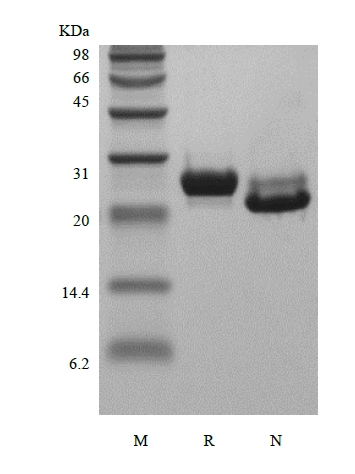| Official Full Name |
Recombinant Human Prostate-Specific Antigen/Kallikrein-3 (rHuPSA/Kallikrein-3) |
| Squence |
 |
| Amino Acid Sequence |
|
| Synonyms |
|
| Accession Number |
|
| GeneID |
|
| Summary |
|
| Source |
Escherichia coli. |
| Molecular Weight |
|
| Biological Activity |
No data available. |
| Appearance |
Sterile Filtered White lyophilized (freeze-dried) powder. |
| Formulation |
Lyophilized from a 0.2 um filtered concentrated solution in 20mM Tris-HCl, pH 8.0, 150mM NaCl, 3% trehalose. |
| Endotoxin |
Less than 0.1 EU/ug of rHuPSA/Kallikrein-3 as determined by LAL method. |
| Reconstitution |
We recommend that this vial be briefly centrifuged prior to opening to bring the contents to the bottom. Reconstitute in sterile distilled water or aqueous buffer containing 0.1 % BSA to a concentration of 0.1-1.0 mg/ml. Stock solutions should be apportioned into working aliquots and stored at ≤ -20 °C. Further dilutions should be made in appropriate buffered solutions. |
| Stability and Storage |
Use a manual defrost freezer and avoid repeated freeze-thaw cycles.- 12 months from date of receipt, -20 to -70 °C as supplied.- 1 month, 2 to 8 °C under sterile conditions after reconstitution.- 3 months, -20 to -70 °C under sterile conditions after reconstitution. |
| References |
The human tissue kallikrein (KLK) gene family contains 15 members that play important roles in cancer. Kallikrein-3, called prostate specific antigen (PSA), is a glycoprotein enzyme encoded in humans by the KLK3 gene. PSA is secreted by the epithelial cells of the prostate gland, hydrolyzes semenogelin-1 thus leading to the liquefaction of the seminal coagulum. PSA is an established tumor marker that aids in the diagnosis, staging, and follow up of prostate cancer. |
| SDS-PAGE |
 |
| Safety Data Sheet (SDS) Download |
Click to download |
| Technical Data Sheet (TDS) Download |
Click to download |



